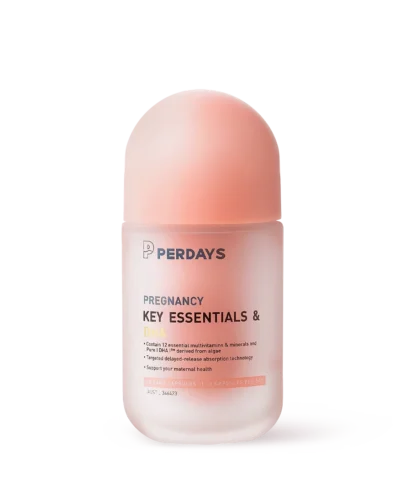Contents
Prenatal Multivitamins - How important is it to take them during pregnancy?
By Perdays Team
Prenatal Multivitamins in a Nutshell
- Prenatal multivitamins are supplements specifically designed to support the nutritional needs of women planning a pregnancy, pregnant, and postpartum.
- These multivitamins bridge the nutritional gaps between a healthy diet and the increased nutrient requirements during pregnancy, including folate, iodine, iron, and omega-3s.
- Folate in prenatal vitamins helps prevent defects in the baby’s neural tube and supports ovulation prior to conceiving.
- Iodine is a critical nutrient for thyroid function and brain development in the fetous.
- Research shows that many pregnant women do not meet nutrient requirements through diet alone, highlighting the importance of consistent prenatal multivitamin use throughout pregnancy and postpartum.
Prenatal Multivitamins
One of the first steps when planning to conceive and hopefully become pregnant in the near future, is to start researching about prenatal multivitamins.
You may have arrived at this article wondering which one is best for you and what the differences really are, and you may be thinking is “why is it important to take a prenatal multivitamin at all?”
Let’s explore the ins and outs of navigating prenatal multivitamins, what they are, when to take them and why they are important!
What are prenatal multivitamins?
A prenatal multivitamin or prenatal supplement is a specifically formulated supplement to support the needs of women who are planning a pregnancy, pregnant and post-partum. It is designed to help bridge the gaps between a healthy, balanced diet and the increased requirements for key nutrients during pregnancy including folate, iodine, iron and omega-3s and so on.
Why take a prenatal vitamin?
A prenatal multivitamin is absolutely essential for the health of your baby. In fact, the Royal Australian and New Zealand College of Obstetricians and Gynaecologists (RANZCOG) pre-pregnancy and pregnancy care guidelines state that any woman planning a pregnancy or during pregnancy, especially in the first trimester, should be taking a prenatal vitamin that contains folate/folic acid and iodine.
Folate helps prevent defects in the neural tube which is laid down in the earliest weeks of pregnancy and is your future baby’s spinal cord and brain. In fact, there is a 50% increase in your folate requirements during pregnancy, and with many experiencing symptoms of nausea, food aversions and changes in bowel motions, this can mean you’re less likely to get in those green leafy vegetables as much as you’d like to meet increased folate demands.
Plus, folate may also be helpful in supporting ovulation prior to conceiving, with a study showing that low levels of folate are associated with more irregular ovulation patterns and also lower pregnancy rates (Gaskins et al., 2014; Westphal, Polan & Trant, 2006).
Iodine is the other critical nutrient to be included in a prenatal vitamin. This mineral is mostly concentrated in the thyroid where it forms all important thyroid hormones which are not only looking after every cell in your body but is also supporting your baby too, until their own thyroid is developed and starts functioning at about 20 weeks.
Not enough iodine during pregnancy can not only impact thyroid function, but also can affect foetal brain development and future intelligence. With the inconsistent amount of iodine found in our soil, it is critical to ensure your prenatal vitamin contains at least 150 mcg of iodine, leaving about 70 mcg of iodine to achieve through diet. Using iodised salt at home in your cooking, choosing breads made with iodised salt and eating freshly cooked and cooked through seafood regularly can help you achieve these requirements.
Whilst the RANZCOG guidelines focus primarily on the important of folate and iodine in the first trimester, new research has shown that pregnant women in their third trimester in Australia are still sub-optimal and not meeting requirements for zinc, folate, calcium , fibre and iron through diet alone. (Slater et al., 2020).
Astonishingly, this Australian research showed that only 4 out of 534 pregnant women met these key nutrient requirements for pregnancy through diet alone, highlighting the need for consistent prenatal multi-vitamin use not only in the first trimester but throughout pregnancy and into post-partum where requirements for nutrients such as iodine increase further whilst breastfeeding.
When should I start taking a prenatal multivitamin?
It is recommended you commence a prenatal vitamin prior to conceiving, where possible, start taking a prenatal multi-vitamin at least 1 month before starting to try for a baby. Ideally, you should start prenatal multivitamins 3 months prior to conceiving. This is because the 90 days or so before you ovulate are key in supporting egg quality, and a high-quality prenatal multi-vitamin can help provide additional nutrients to support egg health.
What if I am healthy and my bloodwork looks good, do I still need to take prenatal multivitamins?
Whilst it is always a good idea to touch base with your health care provider for a check-up and some blood tests before conceiving and throughout your pregnancy, it is still important to take your prenatal vitamin even if everything looks normal on your bloodwork. This is because you need to support the increased requirements and not every important nutrient can be tested for in your blood with your doctor.
If something is out of range, work with your health care provider to correct this prior to pregnancy or during pregnancy. Some of the common nutrient deficiencies that women experience during this time include iron deficiency as iron demands rapidly increase to support expanding blood volume in the second and third trimesters and also vitamin D deficiency. Both should be corrected appropriately with a personalised plan to not only avoid symptoms like fatigue, but also to support yours and your baby’s health and well-being.
Speak to your health care provider for individualised advice.
6 Top Tips for Choosing a Prenatal Vitamin from a Pregnancy Dietitian & Nutritionist
- Check for a low-mercury source of omega-3 fatty acids, namely DHA, to support baby’s brain development.
- Ensure the supplement includes vitamin D and iron to help meet your daily needs.
- Make sure your prenatal multi-vitamin comes with some B12 to help support the role of folate in the body. The two work together as a team in the body.
- Ensure it meets your dietary requirements whether that be gluten-free, dairy-free, lactose-free or vegetarian/vegan.
- Choose the right format for you – most people prefer an easy to swallow capsule.
- Don’t choose your prenatal supplement because your sister or best friend told you too. Check it out for yourself and have a chat with your health care provider for tailored advice.
It is important to note that some people taking certain medications, with certain medical conditions and family history and with different BMIs may require more folate. It is critical you consult with an expert prenatal dietitian & nutritionist to ensure you’re taking the right pregnancy multi-vitamin for your needs
Taking prenatal multivitamins that suit your body’s needs prior to, during pregnancy and post-partum is a small act of self-care during what can be a very precious time in your life as you prepare to grow a healthy baby.
*Advise your doctor of any medicine you take during pregnancy, particularly in your first trimester. If you are concerned about the health of yourself or your baby, talk to your health care practitioner.
Looking For a Pregnancy Multivitamin with DHA?
Perdays Pregnancy Key Essentials & DHA Perdays is designed to work synergistically to support your preconception and prenatal health, thanks to our patented Nutriseal™ encapsulation technology. This pregnancy multivitamin contains a precise combination of 12 essential prenatal vitamins & minerals with algae-derived DHA and Folinic Acid to be absorbed by all women.
References
- https://ranzcog.edu.au/wp-content/uploads/2022/01/Maternity-Care-in-Australia-Web.pdf
- https://pubmed.ncbi.nlm.nih.gov/24901281/
- https://pubmed.ncbi.nlm.nih.gov/17211965/
- https://www.mdpi.com/2072-6643/12/8/2438/htm


